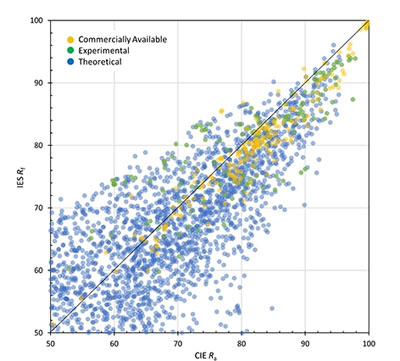The emergence of SSL technology quickly challenged longstanding performance metrics used for assessing color quality, particularly the International Commission on Illumination (CIE) Test Color Method (which includes the General Color Rendering Index Ra, commonly known as CRI). The introduction of new measures of color rendition, especially Illuminating Engineering Society (IES) TM-30-15, has stirred debate within the lighting industry on the relative merits of the tools, as well as the amount of difference between the new tools and prior tools, such as CIE Ra.
As part of its efforts to help industry develop and implement new methods and measures that address CRI’s widely acknowledged limitations, DOE conducts foundational research to augment our understanding of color rendition, and reports on it in peer-reviewed journals. One such article, published online by the journal LEUKOS, is entitled “Comparing Measures of Average Color Fidelity.”
-Comparing Measures of Average Color Fidelity
The article documents the performance of the 2015 IES Fidelity Index (Rf) – whose development was supported by DOE – compared to CRI. To contrast these two measures of how a light source affects the color appearance of objects, ratings of nearly 5,000 real and theoretical light sources were calculated in a search for systematic differences. The results indicate that CRI more strongly penalizes increases in the vibrancy of reds, due to the outdated models of vision and color that underlie the calculation. This is a critical limitation, because the vibrancy of reds is a key factor affecting how people judge the quality of light sources.

Comparison of IES Rf and CIE Ra for the large SPD set, showing only data points where both measures are greater than or equal to 50. This includes 2,303 SPDs (203 commercial, 136 experimental, 1,964 theoretical).
Because metrics help drive product development, it shouldn’t be a surprise that few light sources available today offer the vibrant reds that people appreciate, which is a potential impediment to the adoption of energy-efficient lighting products. The article further demonstrates that coarse averages, such as both CRI and Rf, are typically insufficient for differentiating products with appropriate color quality, which affects both lighting research and lighting practice. Thankfully, Rf is part of a broader system (IES TM-30), which provides the level of detail necessary for developing the next generation of high-quality, energy-efficient solid-state lighting.
Related Resources
-Color Rendition Research
-TM-30 Frequently Asked Questions
-Workshop Presentation: Human Perceptions of Color Rendition Experiments, Analysis, and Steps Forward (November 2017)
-Journal Article: LEUKOS – Chroma Shift and Gamut Shape: Going Beyond Average Color Fidelity and Gamut Area (October 2017)
-Journal Article: Lighting Research & Technology – Human Perceptions of Color Rendition Vary with Different Chromaticities (August 2017)
-Webinar: What Have We Learned About TM-30 in the Past 2 Years? (September 2017)
-Presentation: TM-30, Color Preference, and More (April 2017)
-Journal Article: LEUKOS – The Role of Presented Objects in Deriving Color Preference Criteria from Psychophysical Studies (January 2017) |